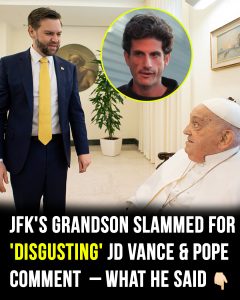Jack Schlossberg may carry the Kennedy name and legacy, but the internet is far from impressed with his recent online behavior. At just 31 years old, the only grandson of President John F. Kennedy and Jacqueline Kennedy is making headlines—and not for reasons the Kennedy family would be proud of. In a moment that quickly spiraled into controversy, Schlossberg posted a cryptic and inflammatory statement on X (formerly known as Twitter), suggesting without evidence or explanation that Vice President JD Vance was somehow to blame for the death of Pope Francis. His exact words, as posted online, were: “Okay JD killed the pope.” The timing of the remark—early Monday morning, just as news of Pope Francis’ passing at age 88 was breaking—only intensified the reaction. The post quickly went viral, amassing over 470,000 views in just a few hours, but not because it was witty or insightful. Instead, Schlossberg was met with a flood of criticism from users who found the comment distasteful, disrespectful, and tone-deaf. Responses ranged from shocked to angry, with one commenter calling his words “shameful” while another demanded, “Are you kidding with this? Just not funny – total disrespect.” A third user was more direct, saying, “No, Johnny. Maybe it’s time to back off.” Several replies reminded Schlossberg of his family’s strong ties to the Catholic faith, suggesting that someone of his background should know better than to joke—if it even was a joke—about something so serious.

Jack Schlossberg, whose full name is John “Jack” Bouvier Kennedy Schlossberg, is the youngest child of Caroline Kennedy and the only grandson of the late President John F. Kennedy. He’s known not just for his prominent lineage but also for his charisma and polished appearance, traits often compared to his grandfather’s. Beyond the Kennedy name, Schlossberg has carved out a presence on social media, especially Instagram, where he frequently shares his political opinions, humorous content, and videos showcasing his ability to mimic various accents. His educational background is equally impressive. He interned in the U.S. Senate in 2011, earned his undergraduate degree at Yale University, and went on to attend Harvard, where he received both his M.B.A. and his J.D. degrees. Despite these achievements, his online behavior has raised questions about maturity and responsibility, particularly when dealing with topics of such gravity.
The context for Schlossberg’s controversial tweet may be rooted in a recent meeting between Vice President JD Vance and Pope Francis. Just one day before the Pope’s death, Vance was in Rome for Easter and had a private audience with the Pontiff following Sunday Mass. Although not formally scheduled, the meeting was significant to Vance, a Catholic convert who has spoken openly about his faith. In a short video clip from the meeting, Vance is seen showing genuine concern for the Pope’s declining health. “I pray for you every day,” he tells Pope Francis. The Pope, who appeared physically frail, presented Vance with Easter eggs for his children—a gesture that added a deeply personal note to their interaction. The meeting was brief, lasting only 17 minutes, but it clearly left an impression on the Vice President.
When the news of Pope Francis’ death emerged the following morning, Vance took to X to express his sorrow and offer a heartfelt tribute. “I just learned of the passing of Pope Francis,” he wrote. “My heart goes out to the millions of Christians all over the world who loved him.” In his post, Vance recalled their meeting, acknowledging how ill the Pope had looked and sharing one of the Pontiff’s most powerful prayers from the early days of the COVID-19 pandemic. His message struck a reverent and reflective tone, in sharp contrast to the internet firestorm surrounding Schlossberg’s tweet.
As for the cause of Pope Francis’ death, Cardinal Kevin Farrell, speaking on behalf of the Vatican, confirmed that the Pope died from a massive stroke, not from the respiratory issues he had previously battled. According to doctors, the Pope had awakened around 6 a.m., but by 7 a.m. his condition worsened rapidly. Within 30 minutes, he slipped into a coma and never regained consciousness. He died peacefully at 7:35 a.m., not in a hospital, but in the quiet seclusion of Vatican grounds. Cardinal Farrell described him as “a true disciple” who devoted his life to serving “the poorest and most marginalized.”
Throughout his papacy, Pope Francis was widely respected for his humility and commitment to social justice. He famously chose to live in a modest Vatican guesthouse rather than the lavish papal palace, insisting that the luxury did not align with his values. He also made waves by taking the bus instead of a limousine, underscoring his belief in living simply and in solidarity with the common people. One of his boldest and most talked-about moves was his confrontation with the Italian mafia. In an unprecedented decision, Pope Francis excommunicated mafia members from the Catholic Church and warned them of the eternal consequences of their actions, declaring that their lives of violence and exploitation were incompatible with Christian teachings.
Jack Schlossberg’s decision to insert himself into the conversation surrounding the Pope’s death, especially in such a provocative and baseless way, sparked not only backlash but a broader conversation about the responsibilities that come with a public platform. While it’s unclear whether he intended his comment as satire, sarcasm, or something else entirely, the reaction was swift and overwhelmingly negative. In an era when public figures are expected to demonstrate thoughtfulness and accountability, particularly on sensitive topics, Schlossberg’s tweet missed the mark. For someone born into a family defined by public service, grace under pressure, and Catholic tradition, the incident served as a stark reminder: words matter, and the internet never forgets.





